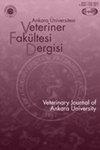Investigation of the Presence of Some Antibiotics in Raw Goat Milk Collected from Ankara, Kırıkkale and Çankırı Provinces
IF 0.9
4区 农林科学
Q3 VETERINARY SCIENCES
引用次数: 0
Abstract
Antibiotics used in food producing-animals may cause residual problems in food in terms of public health. This situation can lead to serious problems in terms of human health. Raw milk is one of the foods that are likely to contain antibiotics, even in trace amounts. This study aimed to determine the residue levels of commonly used antibiotics of raw goat's milk samples offered for sale in Ankara, Çankırı and Kırıkkale. One active ingredient was selected from the five most commonly used antibiotic groups in animals and it determined the residue levels of these substances in milk. For this purpose, within one year and in two different periods, 150 raw goat milks analyzed in terms of antibiotics using HPLC method. The values for enrofloxacin, sulfamethoxazole, tylosin, penicillin G and oxytetracycline were 7.9, 9.7, 11.5, 5.4 and 7.3 minutes for retention times, 1.47, 0.8; 7.51; 2.69 and 8.89 µg/L for limit of detection (LOD) and 4.47, 2.44, 22.78, 8.16 and 26.96 µg/L for limit of quantification (LOQ), respectively. No antibiotic residues were detected in the goat milk samples. It is predicted that the higher resistance of goats to diseases compared to other milk-producing animals, and therefore the lower use of antibiotics in these animals, leads to this result. The findings obtained as a result of this study are valuable in terms of public health. It is important that no antibiotic residues are found in the analyzes.安卡拉、Kırıkkale和Çankırı省生羊奶中抗生素含量调查
生产食品的动物使用的抗生素可能会在食品中造成公共卫生方面的残留问题。这种情况可能导致人类健康方面的严重问题。生牛奶是可能含有抗生素的食物之一,即使是微量的。本研究旨在确定安卡拉、Çankırı和Kırşkkale出售的生羊奶样品中常用抗生素的残留水平。从动物中最常用的五种抗生素中选择了一种活性成分,并测定了这些物质在牛奶中的残留水平。为此,在一年内,在两个不同的时期,用高效液相色谱法对150份生羊奶进行了抗生素分析。恩诺沙星、磺胺甲恶唑、泰乐菌素、青霉素G和土霉素的保留时间分别为7.9、9.7、11.5、5.4和7.3分钟,分别为1.47、0.8;7.51;检测限(LOD)分别为2.69和8.89µg/L,定量限(LOQ)分别为4.47、2.44、22.78、8.16和26.96µg/L。山羊奶样本中未检测到抗生素残留。据预测,与其他产奶动物相比,山羊对疾病的抵抗力更高,因此这些动物的抗生素使用量更低,导致了这一结果。这项研究的结果对公共卫生很有价值。重要的是,在分析中没有发现抗生素残留。
本文章由计算机程序翻译,如有差异,请以英文原文为准。
求助全文
约1分钟内获得全文
求助全文
来源期刊
CiteScore
1.50
自引率
0.00%
发文量
44
审稿时长
6-12 weeks
期刊介绍:
Ankara Üniversitesi Veteriner Fakültesi Dergisi is one of the journals’ of Ankara University, which is the first well-established university in the Republic of Turkey. Research articles, short communications, case reports, letter to editor and invited review articles are published on all aspects of veterinary medicine and animal science. The journal is published on a quarterly since 1954 and indexing in Science Citation Index-Expanded (SCI-Exp) since April 2007.

 求助内容:
求助内容: 应助结果提醒方式:
应助结果提醒方式:


